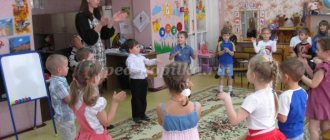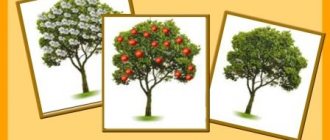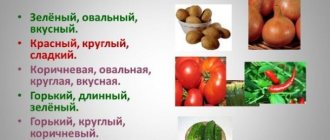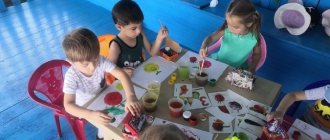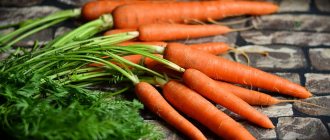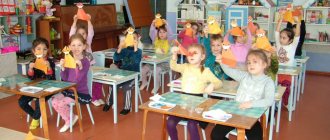Summary of a speech therapy lesson in the middle group on the lexical topic “Vegetables”
— Correctional educational goals : expand and activate the vocabulary on the topic.
— Corrective and developmental goals : improve the grammatical structure of speech (coordination of nouns with adjectives in gender and number, formation of relative adjectives, formation of nouns using diminutive suffixes, changing the number of nouns), develop visual attention, thinking, coordination of speech with movement, fine motor skills
— Correctional and educational goals: to cultivate a love for the plant world, the desire to care for vegetables; talk about the benefits of vegetables for our body.
1. Org. moment.
Hello guys. Today I brought a very interesting book with bright pictures and interesting riddles to our lesson. Please listen carefully, try to guess what these riddles are about.
2. Guessing riddles.
There is a yellow ball in the garden. But he doesn't run at a gallop. It is like the full moon, the seeds in it are delicious. (Pumpkin)
Round side, yellow side, Gingerbread Man sits on the bed. Rooted firmly into the ground. What is this? (Turnip)
The beautiful maiden sits in prison, and her braid is on the street. (Carrot) Grandfather sits in the ground, wearing a hundred fur coats. Whoever undresses him sheds tears. (Onion)
Purple caftan Wears a vegetable... (Eggplant)
One hundred clothes - All without fasteners. (Cabbage) There are green ones in the garden, and salty ones in the jar. (Cucumbers)
How riddles grew in our garden bed, juicy and large, so round. They turn green in summer, and turn red in autumn. (Tomatoes)
- Well done, you solved all the riddles. How can we call all this in one word?
(These are all vegetables. - Where do vegetables grow? (In the garden, in the garden bed). What other vegetables do you know? (Beets, potatoes, zucchini)
Each named vegetable is accompanied by a picture.
Fine. Please tell me how they eat vegetables, maybe they cook something from them? (Yes, vegetables are used to make soup, salad, puree, and juice.) Great.
3. Formation of adjectives.
What kind of salad can be made from cucumber? (Cucumber will make cucumber salad).
From zucchini, tomatoes, pumpkin, beets, cabbage, eggplant, onions, carrots.
They form words with the help of a speech therapist.
4. Physical training
Please get your hands ready, we'll make cabbage salad.
We chop and chop cabbage! (2 times)
(children imitate the chopping movements of an ax, moving their straight palms up and down)
We cut the cabbage, cut it! (2 times)
(move the edge of your palm back and forth)
We salt the cabbage, we salt it! (2 times)
(put your fingers together in a pinch and pretend to salt the cabbage)
We press the cabbage, press it! (2 times)
(vigorously clench and unclench your fists)
We three carrots, three! (2 times)
(we squeeze the right handle into a fist and move it up and down along the straight palm of the left hand, pretending to be a grater)
- Didactic ball game “Name it kindly”
Speech therapist. I will throw you a ball and name a vegetable, you will call this vegetable affectionately and throw the ball back to me.
Tomato - tomato; carrots
Cucumber - cucumber; pumpkin - pumpkin;
Onion - onion; beets - beets;
Garlic – garlic; cabbage – cabbage;
Peas - peas; potato - potato.
Well done, take your seats.
- Didactic game “One-many”
Also, I name one object, and you name many.
All vegetables are listed.
- Now I will give you stencils, and in your notebooks you will draw the vegetable that you liked best.
- Summary of the lesson.
Remember what was discussed in class. Assessment of children's work.
Lexical topic: “Vegetables, Vegetable Garden”
Items: vegetable, carrot, potato, beet, onion, tomato, cucumber, pepper, dill, parsley, peas, cabbage, vegetable garden, earth, bed, water, branches, roots, leaves, seeds, cabbage, stem, lettuce, food, cabbage soup, soup...
Signs: colors - red, orange, brown, green, yellow, black, burgundy, etc.; taste – sour, bitter; shape – round, oval, triangular; surface – smooth, rough, even, uneven; denominative adjectives – potato (aya), cucumber (aya), etc.; ripe, unripe, ripe, unripe, tasty, tasteless, sweet, juicy, aromatic, rosy, fresh, canned, boiled.
Actions: plant, water, collect (harvest), grow, bloom, ripen, dig, pick, wash, peel, cut, fry, cook, salt, cook, prepare, eat...
Tasks
1. Select the signs (at least three signs):
cucumber (what?) - ... vegetables (what?) - ...
tomato - tomato cucumber - ... onion - ... pepper - ... peas - ... vegetable garden - ... garden bed - ... water - ... root - ...
tomato - tomatoes bulb - ... pepper - ... cabbage - ... bed - ... stem - ...
4. Yes – no (genitive singular):
tomato - no tomato potato - ... onion - ... parsley - ... vegetable garden - ... soil - ... bed - ... root - ... stem - ...
5. Form signs (from objects):
pumpkin - pumpkin carrots - ... cucumber - ... dill - ... potatoes - ... peas - ...
one cucumber, two cucumbers, three..., four...., five she is a pea, two..., three...., four..., five...
7. Draw or stick pictures of vegetables.
Divide vegetables into 3 groups: vegetables from which we eat what grows in the ground (roots); vegetables in which we eat what grows above the ground (tops).
Show and name the parts: leaves, stem, root, tail, seeds, seeds, peel, core.
Troyan Natalya Anatolyevna, teacher-speech therapist of the MBDOU kindergarten of the combined type “Bell”, Noyabrsk (Yamalo-Nenets Autonomous Okrug)
Source
Speech therapy lesson on the lexical topic “In the garden or in the vegetable garden”
Svetlana Slyusareva
Speech therapy lesson on the lexical topic “In the garden or in the vegetable garden”
Speech therapy lesson on lexical topics :
“In the garden or in the vegetable garden ”
.
Leading educational area: speech development The lesson is conducted with children in a preparatory group for school, in the amount of 10 people.
Goal: To teach children to freely use acquired skills in independent speech when composing a story according to plan.
— activate the dictionary on the topics: “Vegetables. Vegetable garden »
,
"Fruits. Garden"
:
— improve the ability to coordinate nouns and adjectives:
-improve the ability to coordinate nouns and pronouns;
— improve the ability to form adjectives from nouns;
- develop speech and facial movements;
- develop thought processes, learn to identify an extra object;
- develop coherent speech, compose a descriptive story-riddle.
-encourage children to actively work in class , concentrate, and be able to listen and understand the teacher’s information at once;
- to cultivate a desire to express one’s thoughts without being afraid to answer the teacher’s questions;
- to develop in children teamwork skills: cooperation, mutual understanding, mutual assistance, goodwill;
— teach children to answer questions in complete sentences;
- learn to formulate your answers grammatically correctly;
- develop fine motor skills;
-develop auditory perception and auditory attention;
-develop logical thinking, memory, attention, imagination;
- develop the rhythmic and intonation side of speech.
Verbal (reminder, instructions, questions, individual answers from children)
.
Visual (use of illustration)
.
Encouragement, lesson .
To fully implement this type of activity, the following materials and equipment are used:
Demonstration material: multimedia screen, presentation “Vegetables and Fruits”
, magnetic board, dummies of vegetables and fruits, natural vegetables and fruits.
Handout: subject pictures on the topics “Vegetables. Vegetable garden »
,
"Fruits.
Garden" Planned results: children freely use acquired skills in independent speech when composing a story on the lexical topic "Vegetables, fruits"
according to plan, actively and kindly interact with the teacher and peers in solving gaming and cognitive problems; act concentratedly for 25 – 30 minutes.
Lexical topic “Garden, vegetable garden.” Automation of sound [C].
Olga Nikolskaya
Lexical topic “Garden, vegetable garden.” Automation of sound [C].
Form the semantic field of the word SAD, develop the semantic connections of words.
Practice practical modification and formation of words.
Strengthen the pronunciation of the sound [C] in syllables , words, sentences, phrases, coherent statements;
Continue to develop phonemic processes: hearing, perception, ideas; practice sound-syllable analysis ;
Develop logical thinking.
To develop self-control in children over their speech and the skills of consciously correct pronunciation of sounds .
Create an atmosphere of friendly communication and comfort in class.
Equipment: picture of a gardener, diagram of sound , picture of a garden, vegetable garden , ball, picture with syllables.
